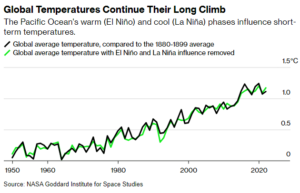COP 28 part 2; forward into the past
COP 28 ends with a Bang and a Whimper
The UN climate summit ended on Wednesday with a compromise deal that called for a “transition away” from fossil fuels. The stronger term “phase-out” had been backed by 130 of the 198 countries negotiating in Dubai but was blocked by petrostates including Saudi Arabia.
Nearly 200 countries at the COP28 climate summit have agreed to a deal that for the first time calls on all nations to transition away from fossil fuels to avert the worst effects of climate change.
The climate agreement has been hailed as historic; first citing of fossil fuels as the root cause of the climate crisis in 30 years of climate negotiations.
But scientists said the agreement contained many loopholes and did not match the severity of the climate emergency. Instead, it reached a compromise that called on countries to contribute to global efforts to transition “away from fossil fuels in energy systems in a just, orderly and equitable manner, accelerating action in this critical decade, so as to achieve net zero by 2050 in keeping with the science”.
The Alliance of Small Island States, representing 39 countries, said it had not been in the room when the deal was adopted as it was still coordinating its response. Its lead negotiator, Anne Rasmussen, from Samoa, did not formally object to the agreement and believed the deal had good elements, but said the “the process has failed us” and the text included a “litany of loopholes”. “ “We have made an incremental advancement over business-as-usual when what we really needed is an exponential step change in our actions and support,” Rasmussen said.
COP28: UN climate summit ends with divisive deal
The governments of the world have agreed on a declaration at the Cop28 climate summit that has been both hailed as historic, but dismissed as weak.
Countries agreed on a text that encourages countries to move away from fossil fuels and quickly ramp up renewable energy
Island states whose homes are being washed away by rising sea levels said the text was an improvement but contains a “litany of loopholes”
Scientists said the document did not go far enough for world leaders to honour the promise they made to keep the planet from heating 1.5C above pre-industrial temperatures by the end of the century
Poorer countries said they were frustrated by the lack of a concrete plan to adapt to climate change and money to do so
During final day of the COP 28 global climate summit:
More countries expressed anger at the climate resolution draft text for its lack of ambition.
The UK’s climate minister criticized for leaving the climate conference early, without any issue resolution, described as “an outrageous dereliction of leadership at the most critical point of the conference…”
Campaigners warn the historic loss and damage agreement from day one of the summit remains unfinished
Indigenous and global south activists called out rich country ‘hypocrisy’ in pushing to phase out fossil fuels
COP28 President Sultan Al Jaber wanted his presidency to be different.
Al Jaber set his sights on the most ambitious agreement since Paris while bringing a deal home on schedule.
Less than 48 hours from the planned end of the summit on Tuesday morning, he was some way off from his ambitions – a place most COP presidents have previously found themselves at this late stage of the summit, that is … the talks weren’t making enough progress and negotiators needed to shift gear. Al Jaber also circled back to the key issue of this COP – that the final text should have language addressing the consumption of all fossil fuels for the first time… “We need to find consensus and common ground on fossil fuel,” Al Jaber said.

Leading oil producers remain opposed
More than 100 countries have said they’d support a phase-out of fossil fuels, but many, including leading oil producers, remain opposed. The hope is to forge a compromise by switching to the softer “phase down” and using adjectives like “unabated” and “orderly.”
China’s veteran envoy, Xie Zhenhua, who held extensive talks with the US team yesterday, wants to link the decline in fossil fuels to the rise in renewables.
Some participants rose to the rhetorical challenge, at least. “A fossil phase-out is the only way to save humankind,” Annalena Baerbock, Germany’s foreign minister and co-leader of the Green Party, said in an impassioned speech.
But the realities of the global transformation of dirty energy remain formidable. Saudi Arabia and other major oil exporters, like Iraq, remain set against any phase-down language – at least for now.
Draft deal is criticized as too weak by many nations in Dubai. No surprises among the attendee stakeholders, as Saudi Arabia remains strongly opposed to fossil-fuel cuts …
A draft deal at the COP28 climate in Dubai called on countries to cut their consumption and production of fossil fuels as the hosts tried to craft a compromise less than 24 hours before the summit is due to end.
The 21-page agreement would, if adopted, be the first specifically calling for reduced use of all fossil fuels, including oil and gas, marking a historic shift in the UN treaty that governs the global fight against climate change. But for many countries it doesn’t go nearly far enough, falling short of a complete phase-out and offering nations loopholes and opt-outs.
Here are some of the noteworthy exacts from the proposed COP 28 climate summit containing 238 individual articles of agreement:
item 38 – Recognizes the need to accelerate sustainable, affordable, and inclusive energy transitions … that would include, inter alia:
(a) Tripling renewable energy capacity globally and doubling the global average annual rate of energy efficiency improvements by 2030;
(b) Rapidly phasing down unabated coal and limitations on permitting new and unabated coal power generation;
(c) Accelerating efforts globally towards net zero emissions energy systems, utilizing zero and low carbon fuels well before or by around mid-century;
(d) Accelerating zero and low emissions technologies, including, inter alia, renewables, nuclear, abatement and removal technologies, including such as carbon capture and utilization and storage, and low carbon hydrogen production, so as to enhance efforts towards substitution of unabated fossil fuels in energy systems.
(e) Reducing both consumption and production of fossil fuels, in a just, orderly and equitable manner so as to achieve net zero by, before, or around 2050 in keeping with the science;
(f) Accelerating and substantially reducing non-CO2 emissions, including, in particular, methane emissions globally by 2030;
(g) Accelerating emissions reductions from road transport through a range of pathways, including development of infrastructure and rapid deployment of zero and low emission vehicles;
(h) Phasing out of inefficient fossil fuel subsidies that encourage wasteful consumption and do not address energy poverty or just transitions, as soon as possible;
item 95 – Highlights the growing gap between the needs of developing country Parties, in particular those due to the increasing impacts of climate change compounded by difficult macroeconomic circumstances, and the support provided and mobilized for their efforts to implement their nationally determined contributions, highlighting that such needs are currently estimated at USD 5.8–5.9 trillion for the pre-2030 period
item 103 – Emphasizes the importance of scaled up public finance and urges developed country Parties to urgently and significantly scale up their provision of climate finance, technology transfer and capacity;
item 194 – Recognizes the importance of international collaboration in enhancing climate action across all actors of society, sectors and regions, including transboundary cooperation, in contributing to progress towards the goals of the Paris Agreement; and urges Parties and nonParty stakeholders to join efforts to accelerate delivery through inclusive international collaboration;
item 232 – Emphasizes Parties’ collective commitment to promote international cooperation to address implementation gaps and ensure comprehensive responses to climate change, in the context of sustainable development …
COP 28 – Climate Quote of the Day
“The Republic of the Marshall Islands did not come here to sign our death warrant,” said John Silk, head of delegation for the Marshall Islands, a nation at risk from rising sea levels. “What we have seen today is unacceptable. We will not go silently to our watery graves.”





Very creative rendering of expressions by color coded text!